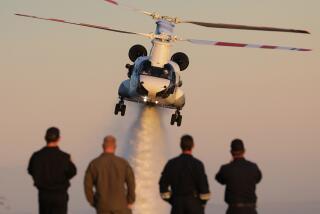Burbank Should Yield a Bit on Airport Expansion Issue
- Share via
Two disputes over San Fernando Valley airports have taken decidedly different turns--one for the better, one for the worse. Late last month, the Federal Aviation Administration gave permission to Los Angeles officials to limit noisy flights out of Van Nuys Airport--a relief to neighbors plagued by the roar of jets and the incessant thumping of helicopters. But on the very same day, officials from Burbank announced that they were dropping out of mediation talks with the Burbank-Glendale-Pasadena Airport Authority--a move that means legal bills will continue to mount as Burbank knuckles down to fight expansion of the airport that bears its name.
In a letter to lawyers for the city of Los Angeles, the FAA gave its blessing to a proposal that would extend a flight curfew at Van Nuys by one hour. The current curfew for jets louder than 74 decibels runs between 11 p.m. and 7 a.m. City officials and neighbors want the curfew to begin at 10 p.m. but needed the FAA’s blessing before making changes that might interfere with flight schedules. Now that the FAA has signed off on the idea, city officials should move quickly to impose the curfew and then enforce it vigorously. Too often in the past, pilots scoffed at city fines, simply refusing to pay. For a curfew to work, enforcement must be aggressive.
As the nation’s busiest general aviation airfield, Van Nuys Airport brings uncountable benefits to the Valley. But it also brings considerable noise--much of it caused by the small, private jets used by corporate and entertainment executives, as well as the helicopters used by media organizations and traffic-reporting services. Bumping the jet curfew to 10 p.m. balances the needs of commerce and the desires of nearby residents.
And although the FAA also gave Los Angeles officials permission to regulate helicopter traffic--which many neighbors find most irksome--imposing those restrictions probably will be more difficult because they can be applied only after public hearings and environmental studies. Nonetheless, they should be pursued in a way that grants news and traffic services the kind of flexibility they need without placing too much of a noise burden on the surrounding community. One possible solution: imposing a helicopter curfew between midnight and 6 a.m.
Curfews, too, were among the central issues that bogged down private negotiations between Burbank and the independent authority that runs Burbank Airport. The two sides are at odds over plans to replace the airport’s aging terminal with a bigger facility. Burbank officials rightly fear that without the proper restrictions, a new terminal would increase noise and traffic levels. But they wanted more than the airport authority and the airlines were willing--or even able--to offer. Among them: lower noise limits and stronger curfews. The breakdown of talks means the dispute will be settled in the courts at huge costs to taxpayers. Already, both sides have spent millions that could have been put to better use than enriching attorneys.
As in Van Nuys, the trick in Burbank is balancing competing needs and interests. That balance is the very foundation of a democratic society; each side gives a little and both walk away feeling like they got a fair deal. In Burbank, it seems, that principle has long since been forgotten. Yes, the airport has reduced noise levels by requiring quieter jets, but airline executives still bristle at the mention of additional restrictions. Yes, Burbank has a right and responsibility to protect its residents, but some of its demands are impossible for the airport authority to guarantee.
Blame for the overall stalemate rests on both parties, but the most recent breakdown in negotiations was prompted by Burbank’s unilateral decision to quit the talks because it thought the authority was unresponsive. In a letter last week, the mediator hired to conduct talks between the airport and Burbank correctly pointed out that “negotiating a resolution to this long-standing and complex dispute will require a great deal of give and take by committed representatives who treat one another with respect and refuse to give up without knowing what is possible.” Instead, the courts must sort it all out--only guaranteeing that the fight over expansion will drag on for years and that, regardless of the outcome, no one will be happy.
More to Read
Sign up for Essential California
The most important California stories and recommendations in your inbox every morning.
You may occasionally receive promotional content from the Los Angeles Times.













